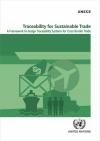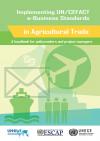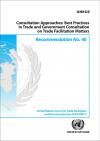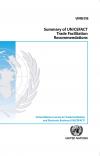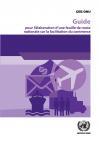Publications
Displaying Results 61 - 80 of 127
- English
Public-Private Partnerships (PPPs) is a possible solution for financing and implementing public projects. These projects allow the public sector to benefit from private sector funding, expertise and capacity while allowing the private sector to partner with the public sector in providing critical public services. There are a number of areas within Trade Facilitation
- English
The joint UNECE-OECD publication “International Regulatory Cooperation: the Case of the United Nations Economic Commission for Europe” presents the rule-making and standards-setting activities of UNECE.
It is illustrated by a number of examples that show how UNECE impacts our daily lives, including through:
- English
Consumers and producers are increasingly interested in knowing how products are made and whether there are any adverse environmental or social impacts. While two products may look or feel similar, consumers may still distinguish between them on the basis of certain intangible policy claims, such as whether they are “organic” or “sustainably produced”. Since these types of claims are difficult
- English
This Handbook presents a general framework for the design of of e-Business projects in the agrifood sector using open, international standards. It specifically looks at four e-Business standards developed by UN/CEFACT in the areas of:Electronic phytosanitary certificates; Electronic reporting of sustainable fishery management; Electronic exchange of laboratory
- English
The purpose of Recommendation N°. 40 (ECE/TRADE/423) is to inform government agencies and private sector stakeholders about approaches to effective consultations that will be flexible, transparent, fair, accountable, and participatory. This Recommendation addresses issues such as
- English
International trade in agricultural and food products is more complex than trade in manufacturing – trade regulations are stricter, paperwork is more cumbersome and logistics are more complex. These elements are mainly required for ensuring food safety for consumers. Detailed information on traded goods alongside the movement of goods in a supply chain is critically
- English
This publication (ECE/TRADE/346/Rev.1) contains the latest information on trade facilitation recommendations established under the auspices of the United Nations Centre for Trade Facilitation and Electronic Business (UN/CEFACT). The publication provides a summary of the approved
- English
The aim of this bi-lingual Publication (ECE/TRADE/424) is to help bring voluntary standards into the toolbox of disaster risk reduction, including both by encouraging their use by business and by enhancing their role in regulatory practice and policy-making more generally. To this end, the paper
- English
This Recommendation, first published in 1974, has been revised in light of the changing context for Trade Facilitation and the adoption of the Trade Facilitation Agreement of the World Trade Organization. The revised Recommendation suggests that governments establish national trade facilitation bodies (NTFB) as an indispensable component of trade policy formation
- English
Trade facilitation creates a reliable, fast and cost-effective trade environment that benefits all countries and businesses, especially small and medium-sized enterprises (SMEs). It’s a collaborative effort by governments and traders to cut the costs of doing trade, reduce delays at borders, and make public agencies dealing with trade more efficient.Multiple
- English
Sixteen UNECE recommendations have been adopted by the Working Party since 1970 to address standardization and regulatory issues. They set out good practice regarding Regulatory cooperation, Metrology, Standards and Norms, Conformity assessment and Market surveillance.
Download the publication (ECE/TRADE/379/Rev.1) in
- English
In recent years, trade facilitation (TF) has been recognised as a key factor in trade and economic development policy. This is due to the realisation that trade facilitation can generate major benefits for the economy in terms of competitiveness and efficiency and can greatly enhance the participation of developing and transition economies in the global economy.
- English
The activities carried out by UN/CEFACT have very significant effects on the world we live in. They not only have specific impacts related to trade and e-business cutting across a broad range of domains, they also play a significant role in efforts to achieve even the most overarching goals such as poverty eradication and the reduction of inequality within and between
- English
This updated 2015 brochure (ECE/TRADE/415/Rev.1) provides information about the resources available, free of charge, from the United Nations Economic Commission for Europe (UNECE) that can be used to support Aid-for-Trade projects. The resources include international conventions, publications, standards and training materials, and
- English
This bilingual (English/Russian) publication (ECE/TRADE/418) presents the results of the International Conference on “Standards and Regulatory Systems”, held in Geneva on 19 November 2013 and organized by UNECE in cooperation with the Russian Union of
- English
UN/CEFACT Recommendation 34: Data Simplification and Standardization for International TradeRecommendation Number 34 (ECE/TRADE/400) was developed in response to a particular set of requests from Single Window implementers who were faced with the task of harmonizing and standardizing government information
- English
UN/CEFACT Recommendation 35: Establishing a Legal Framework for an International Trade Single Window The publication (ECE/TRADE/401) of Recommendation 35 adds to the suite of products offered by UNECE to assist with the establishment of a Single Window. There
- English
This brochure (ECE/TRADE/415) provides information about the resources available, free of charge, from the United Nations Economic Commission for Europe (UNECE) that can be used to support Aid-for-Trade projects. The resources include international conventions, publications, standards and training materials, and are available to
- English
...The Single Window Planning and Implementation Guide contains managerial guidelines for policy managers, policymakers and those who are tasked to plan and manage the information technology-enabled Single Window development projects for simplifying cross-border trade procedures and document requirements within
- English
This publication guides policymakers in the design of regulatory systems that result in an efficient, effective and transparent management of risks.
Recent years have been marked by many catastrophic events both natural and man-made. Close interconnections mean that the impact of these crises has been felt throughout the world. Although many tools have been developed to manage risks successfully




